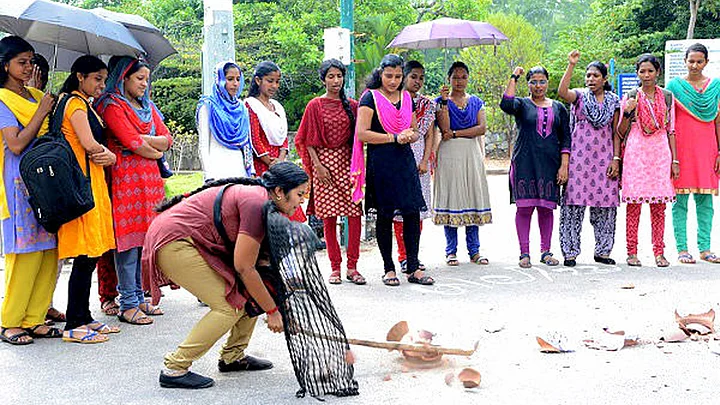On 28 April, Jisha, a Dalit girl in Perumbavoor in Kerala was brutally raped and murdered in her own house. As the ghastly details of the case emerge, it also a grim reminder of the 2012 Delhi gangrape – a comparison media reports and social media users are quick to make.
The comparison is justified to an extent because of the similar brutality and incidence of senseless violence in both the cases. However, we must remember that every case of rape is a brutal affair. [The degree of] graphic violence must not become the criteria to outrage over one instance of rape and victim blaming in the other.Kavita Krishnan, Women’s Rights Activist and Secretary of AIPWA
Even as angry and shocked citizens have taken to the social media to protest the incident, it appears that women’s safety has been declining in the state for the last five years.
According to the data on the Kerala Police website, the number of rape cases has recorded a rise of 11.5 percent from 2011. From 1132 cases of rape in 2011, the number has increased to 1263 in 2015.
I don’t think “matriarchal” is the right word here, “matrilineal” is more appropriate. While it means that the woman’s kin can say, control the property, they tend to be male relatives too. Drawing parallels between levels of education and rape is a class based idea.Kavita Krishnan, Women’s Rights Activist and Secretary of AIPWA
India has never been a kind country for women, what with incidents of honour killings, assault and rape being reported frequently. Even so, the south has prided itself for lesser incidences of violence against women. Kerala especially carries the perception of being a highly educated, progressive and rooted in a matriarchal society. However, it appears that the state does not fare much better when it comes to violent crimes against women, especially molestation and rape.
As per another report, the incidence of rape in Kerala is 63 per lakh population while the national average stands at 56.3 – thrice as high as the rate in the neighbouring Tamil Nadu (18.3). It is quite ironic as Kerala has been performing consistently better in other parameters. Not only does the state have the highest literacy rate and a healthy sex ratio (966 per 1000 men), it also boasts of the highest women’s literacy at 92 percent. The dichotomy between the social indicators and violent crimes is a baffling one.
I think that the education comes from communal sources than democratic ones. The socialisation into patriarchy happens from the school level itself. Educational institutions themselves lean towards disciplinary action that controls women more.Jolly Chirayath, Human Rights Activist from Kerala
Chirayath also added that she had lived abroad and when she came back to Kerala, she found that the patriarchal fabric had become even more stringent in the society.
Kerala may have the social indicators, but ultimately, it is a part of India, which means that it also has a patriarchal mindset.
(In collaboration with The News Minute.)
(At The Quint, we question everything. Play an active role in shaping our journalism by becoming a member today.)
